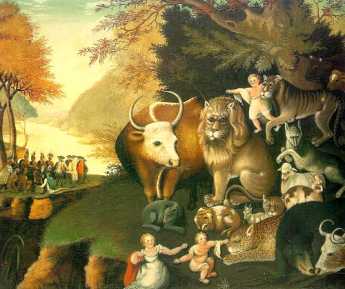Related Topics
Robert Morris: Think Big
Robert Morris wasn't born rich, or especially poor, but he was probably illegitimate. He had no recollection of his mother; his father, a tobacco trader in England, emigrated to Maryland and died rather young. It didn't take long for young Robert to become one of the richest men in America.
Background: Low-Hanging Fruit Starts Running Low

|
| Peaceable Kingdom |
The Royal Proclamation of 1763 terminated the French and Indian War with a clause prohibiting westward settlements past what is now the Appalachian trail. The resulting peacefulness with the Indians encouraged new waves of immigration, but to different degrees among the colonies. Pennsylvania had been settled rather late, so it still had ample room for expansion within its borders. The consequence was prosperity, followed only later by growing land shortage. Since the Proclamation declared that only the British Government might authorize land purchases from the Indians, a suspicious reaction among some speculative minded colonial settlers was that it was intended to create an unfair monopoly for the British Ministry to use as a patronage pool. While the colonials clearly had ulterior incentives, there is no doubting the sincerity of their uneasiness whenever King George appeared to be seeking to co-opt the Parliament, which they viewed as protecting the interest of the citizens against those of the Crown. Other signs of land hunger were beginning to surface as well. Virginia topsoil was wearing out from tobacco farming, while New England never did have more than a thin rocky soil. New England and Virginia were therefore particularly pinched by the Proclamation. Pennsylvania settled nearly a century later was less bothered. George Washington himself was a good example of Virginia Cavaliers turning uneasily toward the vast Ohio Territory for future expansion. Mt. Vernon was already costing him money instead of providing him income. While New Englanders had similar aspirations for the Western Reserve (of Ohio), they also had options of turning to manufacture and maritime trade for revenue.
Meanwhile, the parent nation of Great Britain was itself starting to look for new revenue sources to finance its growing overseas empire and European wars. With a change in the dynasty of Kings of England to the Germanic William and Mary, there appeared to be less sensitivity to the traditions of liberty among English settlers in North America, less awareness of the emotional depth of colonial insistence on individual rights and property. These were not recent 1763 issues; they were connected to English quarrels with King Charles I and other matters dating back to the Magna Carta. But after several decades of outright neglect of America, the British Ministry nevertheless turned to the North American colonies as a cash cow. And just like businesses treated as cash cows within a modern corporate conglomerate, the cows demanded more control over the milking.
To this, add the effect on Puritan minds of licentious behavior reported about the rulers of Restoration England, an impression constantly reinforced by flamboyant costumes and hair-do on display in aristocratic portraits. As viewed by earnest religious settlers in frontier America, this country might be getting to be an empire exploited by unfit rulers, quite unlike the austere religious utopia which had tempted them to settle here. Since the earlier English Civil War had taken the form of empowering members of Parliament to be citizen defenders, ultimately even leading to the execution of Charles I, it was troubling to imagine rentier aristocracy log-rolling with Parliament, even wearing the same sort of garments. These descendants of refugees could even imagine English aristocrats might be reaching across the ocean, and into their pockets.
Originally published: Sunday, July 17, 2011; most-recently modified: Tuesday, May 14, 2019